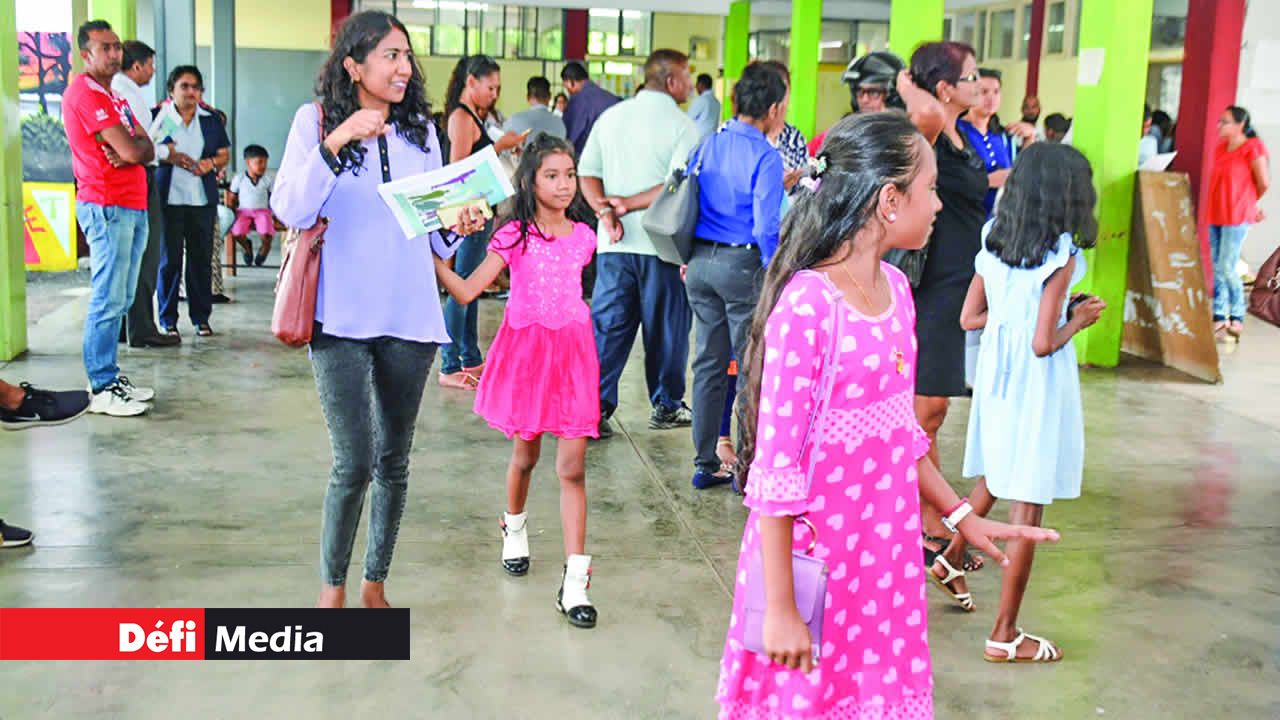
The results of the Primary School Achievement Certificate (PSAC) were out on Tuesday 12th December. While many have shown great satisfaction and say that the Nine Year Continuous Basic Education has relieved children from stress, others were unhappy claiming that there is no transparency when it comes to the allocation of colleges. News on Sunday talks to two unionists in education to have an insight on the matter.
Publicité
20,421 candidates, from both Mauritius and Rodrigues, took part in the new Primary School Achievement Certificate (PSAC) examinations this year. Replacing the Certificate of Primary Education (CPE) examinations, the first edition of the PSAC has recorded a success rate of 77.70%. Again this year, girls have outperformed boys. While the success rate for girls is of 82.58%, that of the boys reached up to 73.01%. In addition, some ZEP schools have performed remarkably well, namely Ste Thérèse de l’Enfant Jésus RCA with a pass rate of 93.1%, Jean Eon RCA with 80.95%, Barkly Government School with 63.1%, among others.
There were both tears of joy and also lots of frustration among many parents on results day. Some parents were overjoyed with their child’s results and claimed that the Nine Year Continuous Basic Education has relieved children from the pressure of the former CPE and the A+ system. They also claimed that the allocation of a college depends on how well the child has done.
On the other side, many have shown much discontent. Indeed, lots of parents around the island have complained that their wards have not been assigned the appropriate college. Some of them are far from their residence while arguing that the new college allocation system is supposedly region based. Others argued that their children obtained better results than others but were assigned to lesser reputed colleges.
A few parents are also claiming that there might be disguised rankings. In addition, many parents argued that there is no transparency on the criteria surrounding the allocation of colleges and that many things are still very vague about the Nine Year Continuous Basic Education.
The Minister of Education, Leela Devi Dhookun-Luchoomun, has assured that no child will be left behind with the new system and that even those who have low performance rates have been assigned a college. She reassured that there will be special classes, namely extended classes, for those who have not reached the required level.
Has the Primary School Achievement Certificate (PSAC) brought more negative than positive changes in the education system? Should it be reviewed? Is the incomprehension of parents legitimate? News on Sunday opens the debate with Roshan Boodnah from the Government Secondary School Teachers’ Union (GSSTU) and Vinod Seegum from the Government Teachers’ Union (GTU).
Roshan Boodnah : “Whether those changes are for the betterment of our children will be unfortunately a time-tested trial and error exercise”

According to the president of the GSSTU, to gauge the necessity, validity, implications and resultant outcomes of the PSAC at this juncture will be somewhat premature. “Any change that is brought to an education system that has already been systemically moulded, recast, modified and amended over the years will warrant an empirical observation of the intended expectations and the challenges which will be encroaching on and halting the attainment of those expectations. Whether those changes are for the betterment of our children will be unfortunately a time-tested trial and error exercise,” says Roshan Boodnah.
He indicates that a comparative study of the pass rate between CPE 2016 and PSAC 2017 indicates a marked improvement in terms of percentage, except for History/Geography wherein the upgrading has been relatively not that significant. “Nonetheless, we need to review that general upswing in results from a purely statistical perspective, and in no way, for the moment, does this phenomenon indicate that the curriculum that has been re-engineered and customised will better appeal to our teaching, learning and assessing endeavours,” he utters.
Has the PSAC put less stress and pressure on the students? “Have we been able to ultimately vanquish the rat race that was looming large over our heads and choking the fragile innocence of our young learners? Or have we simply but summarily deferred the rat race to a later stage, where the implications would be menacingly and irreversibly magnified? Yes, the PSAC examination exercise has been fractioned, but does that mean that a staggered assessment will be wholly beneficial?
Again, only time will tell,” states Roshan Boodnah. Regarding the confusion and discontent of parents concerning the allocation of colleges, Roshan Boodnah trusts that it was expected and is understandable.
“Parents should have been made aware, to put it in simple terms, of the procedures regarding the allotment of Secondary Schools. There should have been consistent briefing sessions by qualified personnel, on the question of student placement regarding parental choice, residential location and student performance, and as to how these would have been used as the ONLY guiding and indivisible parameters.
Now, it has been observed that the very criteria used for the allocation have engendered a deep-seated frustration among many parents, especially those whose wards have statistically excelled but have been allotted a school incongruent with their choice. This becomes highly prejudicial to both parents and children, and if right at the outset, the procedure of allocation of schools is being perceived as flouted and flawed, then it can only spell a gradual mistrust in the system,” he explains.
On a question regarding the allocation of colleges to all students, even low performers who will integrate the extended classes, Roshan Boodnah believes that coaching this category of students requires specific competencies and attributes. “These skills are not within the remit of the mainstream educator, and those very skills are admittedly not acquired over the course of a few makeshift workshops!
There is an urgent need to recruit educators who are academically versed, through tertiary upskilling, to support those educators who were engaged in formerly Pre-Vocational teaching, and thus render the Extended Stream as a necessary and purposeful one.” Concerning competition, will the National Assessment at Grade 9 give rise to more of it?
“Granted that the PSAC wanted to do away with the exaggerated and unwarranted competitive pressure at an untimely stage of a student’s academic path – premises of pedagogy and psychology have been overtly critical of the former CPE system.
But then, the competitive streak is going to be almost immediately amplified with the National Assessment at Grade 9, since authorities have thought it fit to implement a grading system on Secondary Schools, wherein the academies will be opening its doors to the winners of the race!,” argues Roshan Boodnah.
Vinod Seegum : “With the PSAC there is definitely less stress on our pupils”

For the president of the GTU, the Nine Year Continuous Basic Education reform is more or less acceptable. “Without our support, this reform would not have been set up, as we are the principal actors who represent this reform.
The first idea of the reform was that children do not have to transfer to a secondary school but move up to Grade 9 in the same primary school. However, this is not possible.
With the new system, the transition is more accessible. The curriculum has been reviewed. The examination papers have been reinvented and are now light and more child-friendly. With the PSAC, there is definitely less stress on our pupils as there is no A+.
This is why we have seen that the pass rate has improved this year,” utters Vinod Seegum. However, he trusts that we still need the intelligentsia in the country for the future. “We cannot also make it too simple. We have to maintain the level, as we need qualified and well educated citizens who will work for the future of our country.”
On the allocation of colleges, the latter says that he had foreseen that there will be some confusion. “I hope that the Minister of Education will come forward to provide the necessary explanation to parents who are currently confused,” he says.
Vinod Seegum states that the regional basis of the allocation of secondary institution is unfair but he explains that there will be no regional basis when it comes to the allocation of academies at Grade 9. “It’s unfair but in the short term, there is no other way. But I also wonder whether regionalisation is not anti-constitutional.”
Vinod Seegum trusts that the extended classes system is very important. “Unlike before, the students are not graded with ‘F’ or qualified as failures. With the PSAC, these children are given an additional chance to catch up, as they have not yet reached the required level. They will have the opportunity to move to Grade 7 and this is something quite unique. If they had integrated a normal Grade 7 class, it would have been chaotic for them.
They would not have been able to cope with those performing better. This is why the Ministry has set up the extended classes and instead of taking three years to reach Grade 9, these children will go at a slower pace and will be given four years to reach Grade 9.”
He adds that these children will have the support needed. “They will be provided assistance and encouragement from specialised teachers. These teachers have been trained.” Queried about competition among students, Vinod Seegum ascertains that this is why the Nine Year Continuous Basic Education and the PSAC examination have been implemented.
“With the PSAC, there is no competition and no rat race unlike the former CPE system. Many Members of Parliaments also agreed with the Minister of Education that competition at primary level and amongst children aged 10-11 years is unhealthy. With the Nine Year Continuous Basic Education, the competition has been shifted to Grade 9, a level where children will be more able to cope with it in a way.”

Notre service WhatsApp. Vous êtes témoins d`un événement d`actualité ou d`une scène insolite? Envoyez-nous vos photos ou vidéos sur le 5 259 82 00 !















![[Info Soirée] : «Depi li ansint zanfan la pass mizer»](https://defimedia.info/sites/default/files/styles/square_thumbnail/public/thumbnail_180424.jpg?itok=ZOhEXf-J)





![[Explik Ou Ka thématique Part 2] : Services offerts par le CEB](https://defimedia.info/sites/default/files/styles/square_thumbnail/public/thierry_ramasawmy_0.jpg?itok=GE4zjsfL)